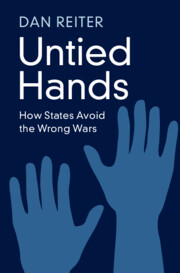Book contents
- Untied Hands
- Frontispiece
- Untied Hands
- Copyright page
- Dedication
- Contents
- Tables
- Acknowledgments
- 1 Introduction
- 2 Keeping Hands Untied to Avoid the Wrong War
- 3 Brinkmanship
- 4 The Absence of Brinkmanship Success
- 5 The Flexibility of Alliance Commitments
- 6 The Flexibility of America’s Cold War Alliances
- 7 Tripwire Force Deployments
- 8 Leaders without Reason and Machines without Souls
- 9 Conclusions
- Index
5 - The Flexibility of Alliance Commitments
Published online by Cambridge University Press: 03 June 2025
- Untied Hands
- Frontispiece
- Untied Hands
- Copyright page
- Dedication
- Contents
- Tables
- Acknowledgments
- 1 Introduction
- 2 Keeping Hands Untied to Avoid the Wrong War
- 3 Brinkmanship
- 4 The Absence of Brinkmanship Success
- 5 The Flexibility of Alliance Commitments
- 6 The Flexibility of America’s Cold War Alliances
- 7 Tripwire Force Deployments
- 8 Leaders without Reason and Machines without Souls
- 9 Conclusions
- Index
Summary
Some propose that states tie hands by signing alliance treaties. The presence of an alliance treaty increases the audience costs of violating a commitment to defend another state, having the effect of tying hands. This chapter argues that states prefer to keep their hands untied to make it easier to avoid getting drawn into the wrong wars. Accordingly, when states design alliance treaties, they routinely include flexibility language in the treaties that enable them to stay out of conflicts involving embattled allies without violating the treaty, thereby reducing or avoiding the audience costs of abandoning an ally. The chapter demonstrates that all alliances since 1945 include such flexibility language, including alliances signed by the US and Soviet Union/Russia. Further, the chapter demonstrates that in every single post-1945 case when a state allegedly abandoned an embattled ally, the flexibility language of the treaty means that the decision to stay out of the conflict did not technically violate the treaty. On the rare occasions when states want to tie hands more tightly to bolster deterrence, they make verbal statements that de facto reduce the flexibility of the alliance treaty, though such verbal statements are crafted to tie hands minimally.
Information
- Type
- Chapter
- Information
- Untied HandsHow States Avoid the Wrong Wars, pp. 109 - 143Publisher: Cambridge University PressPrint publication year: 2025
